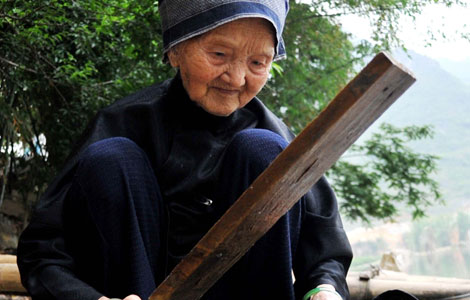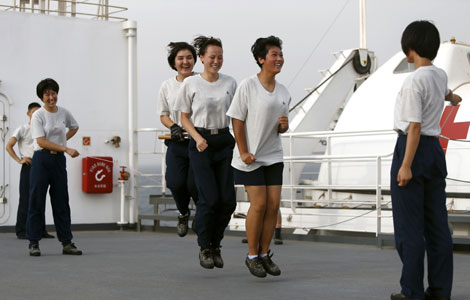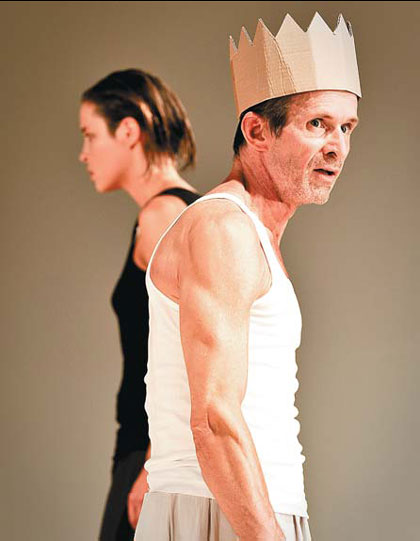Stripping Oedipus to the essentials
Updated: 2013-09-06 07:19
By Han Bingbin (China Daily)
|
|||||||||||
A classic and legendary tale of ancient tragic heroes is being reinvented with a modern spirit.
In the time-honored Deutsches Theater Berlin's new version of Odipus Stadt, or Oedipus State, kings and queens walk around wearing cotton vests, gray longuettes and crowns made of paperboards.
The empty stage, with no sets or props, is a bare floor made into a steep slope on which men and women run in vain to reach the top. One of the men, a powerful king, is played by a woman.
Everything, explains director Stephan Kimmig, has a meaning.
The simplicity of the costumes is an effort to place the audiences' attention solely on the characters' situations, with different colors suggesting their personalities.
Their exposed skin represents the vulnerability of the powerful, and their paper crowns a symbol of how tenuous their grip on power really is.
The slope is their fate that their efforts cannot override, men and women alike. In terms of people's lust for power, gender makes no difference.
Despite what seems experimental, there's nothing genuinely pioneering, says the theater's vice-director Sonja Anders. She says they are going back to the very start of dramatic traditions, using the simplest costumes and stage settings possible to highlight the themes.
"German audiences can understand various ways of expressions. They don't think it's avant-garde. Many of them now like to focus on the performance itself through very simple setting and costume," she says.
"Over the five or so decades of development, German theater has accumulated many such experiences. The form of a play is only decided by its content."
The legend of Oedipus and his royal family was frequently adapted by Aeschylus, Sophocles and Euripides, ancient Greece's three great writers of tragedy, to create such masterpieces as The Seven Against Thebes, Oedipus Tyrannus and The Phoenician Women.
Based on all that has been created, this rearranged trilogy of Oedipus legends respectively deals with the tragedy of Oedipus himself, the fate of his two sons, and his sister Antigone's conflict with the new King Kreon over the distinction between morality and law.
The whole drama ends in a long monologue by Antigone, concluding her debate with Kreon over whether it's right by so-called law to bury her brother Polyneices, who died in a rebellious attack on his own country.
The drama aims to shift the audience's focus from the fate of individual heroes to the history of a city, Thebes, and the correlation between humans, power and the gods. It thus inspires them to reflect upon the political authority of today, which Kimmig says is the ancient drama's echo to a modern context.
"Oedipus is so self-centered that even with so many questions and disputes in his heart, he barely accepts any views from outside. This finally leads to his tragedy," Kimmig says.
"This is like some European, especially German politicians. They make mistakes that they can't even defend for themselves. Their self-centered thinking can lead to an even more severe situation."
Anders says that as it approaches the election, Germany has seen many problems that are related to the theme of this drama.
"The legend of Oedipus is originally from ancient Greece, the birthplace of European democracy. We're glad to present a show with such a connection," she says.

Because the theater is next to Berlin's government district, she says, the drama has attracted many politicians. Ulrich Matthes, who plays Oedipus, adds that German Chancellor Angela Merkel has also watched the show and shared her thoughts subsequently with him for one hour at a dinner.
Last year, the Deutsches Theater Berlin pinned down three themes for this year's round of performances: power, democracy and violence. They have selected a wide range of dramas with those ideas, as classic as the Oedipus State and as modern as a drama called Democracy about Germany's former Chancellor Willy Brandt.
"We hope these dramas will inspire German audiences to think what our democracy is like now," she says.
The play's producers plan to challenge the audience. That's one reason why they gave up the chorus, which ancient Greek dramas always employed, to offer insights by explaining background information, expressing the characters' hidden thoughts or directly commenting on the themes.
"I hope the questions the drama raises are more provocative. We don't want a very harmonious solution. So where is the chorus? It's in the audience, in the media and in people's comments," she says.
hanbingbin@chinadaily.com.cn
|
Deutsches Theater Berlin's new version of Odipus Stadt features the simplest of costumes. Provided to China Daily |
(China Daily 09/06/2013 page18)
Today's Top News
Official dismisses looser capital account fears
Price records set for prime land
Official: US poses a dual threat to global stability
Emerging markets must be heard
Beijing clean air action plan well-received
Japan to test 'ice wall' for leaking water
Xi calls for closer G20 ties to boost world economy
18-year-old panda conceives triplets
Hot Topics
Lunar probe , China growth forecasts, Emission rules get tougher, China seen through 'colored lens', International board,
Editor's Picks

|

|

|

|

|

|






